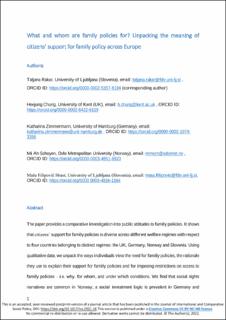| dc.contributor.author | Rakar, Tatjana | |
| dc.contributor.author | Chung, Heejung | |
| dc.contributor.author | Zimmermann, Katharina | |
| dc.contributor.author | Schoyen, Mi Ah | |
| dc.contributor.author | Hrast, Masa Filipovic | |
| dc.date.accessioned | 2022-09-21T09:35:47Z | |
| dc.date.available | 2022-09-21T09:35:47Z | |
| dc.date.created | 2022-08-04T12:45:52Z | |
| dc.date.issued | 2022-01-12 | |
| dc.identifier.citation | Journal of International and Comparative Social Policy. 2022, 38 (1), 1-14. | en_US |
| dc.identifier.issn | 2169-9763 | |
| dc.identifier.issn | 2169-978X | |
| dc.identifier.uri | https://hdl.handle.net/11250/3020139 | |
| dc.description.abstract | The paper provides a comparative investigation into public attitudes to family policies. It shows that citizens’ support for family policies is diverse across different welfare regimes with respect to four countries belonging to distinct regimes: the UK, Germany, Norway and Slovenia. Using qualitative data, we unpack the ways individuals view the need for family policies, the rationale they use to explain their support for family policies and for imposing restrictions on access to family policies – i.e. why, for whom, and under which conditions. We find that social rights narratives are common in Norway; a social investment logic is prevalent in Germany and Slovenia; while in the UK the dominant view is closer to the work-central individualized responsibility narrative of neoliberalism. In addition, we find differences across regimes in who family policies should target. In the UK and Germany, the focus is much more on providing support to activate parents, while in Norway and partly Slovenia the focus is on providing well-being for children. The findings show that despite some convergence in family policies across Europe in recent times, we still find clear diversity in what and for whom family policies are for, its rationale largely embedded in the larger institutional normative structures of the welfare state. The results not only contribute to the literature on the relationship between public attitudes and welfare institutions, but also point towards shifting ideas about the role of family policies in the context of societal change. | en_US |
| dc.description.sponsorship | This research received financial support from a NORFACE grant as part of the Welfare State Futures program (grant number 462-14-052) and the Slovenian Research Agency (research core funding number P5-0200). | en_US |
| dc.language.iso | eng | en_US |
| dc.publisher | Cambridge University Press | en_US |
| dc.relation.ispartofseries | Journal of International and Comparative Social Policy;Volume 38 , Issue 1 | |
| dc.rights | Attribution-NonCommercial-NoDerivatives 4.0 Internasjonal | * |
| dc.rights.uri | http://creativecommons.org/licenses/by-nc-nd/4.0/deed.no | * |
| dc.subject | Welfare attitudes | en_US |
| dc.subject | Family policies | en_US |
| dc.subject | Welfare regimes | en_US |
| dc.subject | Conditionality | en_US |
| dc.title | What and whom are family policies for? Unpacking the meaning of citizens’ support for family policy across Europe | en_US |
| dc.type | Peer reviewed | en_US |
| dc.type | Journal article | en_US |
| dc.description.version | acceptedVersion | en_US |
| dc.rights.holder | © The Author(s), 2022 | en_US |
| cristin.ispublished | true | |
| cristin.fulltext | original | |
| cristin.fulltext | postprint | |
| cristin.qualitycode | 1 | |
| dc.identifier.doi | https://doi.org/10.1017/ics.2021.16 | |
| dc.identifier.cristin | 2041155 | |
| dc.source.journal | Journal of International and Comparative Social Policy | en_US |
| dc.source.volume | 38 | en_US |
| dc.source.issue | 1 | en_US |
| dc.source.pagenumber | 30 | en_US |
| dc.relation.project | Javna agencija za raziskovalno dejavnost Republike Slovenije: P5-0200 | en_US |
| dc.relation.project | NORFACE: 462-14-052 | en_US |

